
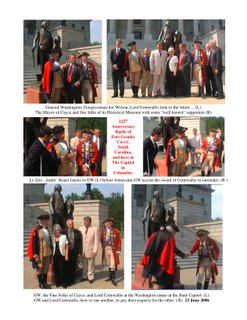
[Click on the image to the left to enlarge it, click again to magnify further so to see the faces and the words closely.]
Local elected servants of South Carolina gather with citizens led by Leo Redmond, director of the Cayce Historical Museum, in advance of the Celebration of the 225th Anniversary of the Battle of Fort Granby, 24 June anno domini 1781, at Cayce, South Carolina, a town that at the time was the principal commercial center in the Midlands, whereas Washington described Columbia as a patch of scrub and pine on his visit during his Southern Tour as President a decade later. Obviously, not in all things was George Washington's Vision for the Future prophetic.
Remember that in Charleston, Lincoln surrendered to the overwhelming force of his adversary, Clinton.
That is American hero and general, Benjamin Lincoln surrendered to British General Henry Clinton. Because of that, General George Washington thought "turn about is fair play" and so sent General Benjamin Lincoln, his Second in Command, to accept the surrender of the British Army at Yorktown.
Therefore, it was most fitting and proper that Charles, Lord Cornwallis, send his "Number Two", General O'Hara to surrender his sword to Lincoln at Yorktown. Yet ever the gentleman soldier, General Cornwallis graciously surrendered his sword to General Washington on this most auspicious occasion to honor the History of Cayce, South Carolina.
During the "Recent Unpleasantness" that locals describe as the "War of Northern Aggression" some Yankee soldiers broke off the end of the walking stick held by Washington, (as seen in the top left picture, behind General Washington's back) but the gentleman soldier, General Cornwallis offered his walking stick to General Washington to try to overcome, for a short time at least, the damage to America and all things American, of that later time in American History.
Just imagine, if every American had followed Washington's example and freed their slaves in their Last Will and Testament so to allow a gradual emancipation of the population to be assimilated into the economy of that time, so to avoid dislocation and even death by mass emancipation, then by 1850, or 1860 at the latest, there would have been no more slavery in America, and "Mr. Lincoln's War" would not have been fought, at least not for that reason.
And remember that William Wilberforce, who worked to eliminate slavery in the British Commonwealth was inspired in his actions by the words of the Founding Fathers in "this Constitution for the United States of America", the first national charter in the history of the world to have any limitation against slavery.
{Although Georgia, alone among the original thirteen states had in its original charter of anno domini 1732, also the year of Washington's birth, that two forms of slavery would not be allowed in the colony of Georgia, physical slavery, or "Slavery" as we know it today, and legal slavery. Originally lawyers were outlawed from Georgia because they cause "financial slavery" for citizens, and Georgia began as a debtors colony, men from Debtors' Prisons, imprisoned by laws and lawyers. Sadly, later, Georgia allowed both forms of Slavery.}
Do what you ask? You've heard our Constitution criticized because it did not abolish slavery then and there, but it did say in Article I, Section 9 that
"The Migration or Importation of such Persons as any of the States now existing shall think proper to admit, shall not be prohibited by the Congress prior to the year one thousand eight hundred and eight..."
This clause was a compromise, for 20 years the Slave Trade would be allowed as legal to continue. But not necessarily for the "benefit" of the Southern States. Remember that one state boycotted the Constitutional Convention. Tiny Rhode Island, a "Northern State" did so, in part because from 1720 on to 1808, between 60 and 80 per cent of the American slave trade was carried in ships sailing out of tiny Rhode Island, slavery was a significant contributor to the economy of Rhode Island.
But look more carefully at the words used by the Founding Fathers: "Importation of such Persons...". The Founding Fathers did NOT use the words "slave", or "bond-servant", or "chattel", they used the word "Persons". The Constitution recognizes the "Personhood" of the black brothers in the hallowed words of this Miracle in Philadelphia.
The wise men who were the Founding Fathers elected George Washington to be the President at the Constitutional Convention in a.d. 1787. In a.d. 1786, Washington wrote to John Francis Mercer of Maryland saying, "There is not a man living who more desires to see the abolition of slavery than I do, but it must be done in gradual, peaceful means through legislation."
A year later, in the legislation of the Supreme Law of the Land, was planted the means for a gradual, peaceful abolition of slavery. The Founding Fathers believed that the abolishment of the Importation of Slaves would gradually end the Institution of Slavery, and likely would have done just that, except Technology intervened to make mince meat of those worthy aims.
In a.d. 1791, the Eli Whitney invented the Cotton Gin, that revived the failing economy of cotton farming, and so "King Cotton" was born. In the years after, most of the slaves in the northern states were "sold South" to the areas where "Cotton was King", and so the inspired dream ("I have a dream...") of the Founding Fathers to gradually eliminate slavery became a distant fading vision.


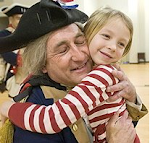

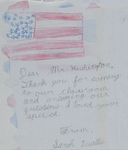
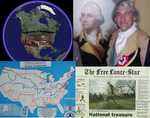
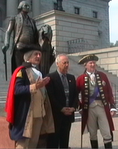





No comments:
Post a Comment